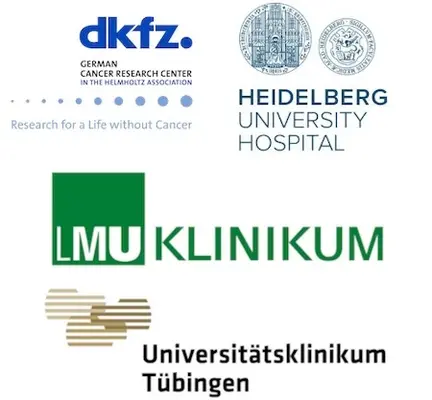PUMA Trial: Pulmonary MR-guided online adaptive radiotherapy of locally advanced non-small cell lung
A Feasibility Study within DKTK
Image-guided adaptive radiotherapy (IGART) is the latest, technically most advanced treatment option in radiotherapy (RT). IGART monitors the anatomy of the day by daily imaging and adapts the treatment plan accordingly with the patient lying on the treatment couch, i.e. the online adaptation. In our multi-centric project called PUMA Trial we perform a feasibility study of magnetic resonance guided radiotherapy (MRgRT) and cone beam computer tomography guided radiotherapy (CBCTgRT) of advanced non small cell lung cancer (NSCLC).
This collaborative project is carried out together with Heidelberg University Hospital (UKHD), the University Hospital of the Ludwigs-Maximilian University of Munich (LMU) as well as the University Hospital of the Eberhard Karls University of Tübingen (UKT). All participating institutes are part of the German Cancer Consortium (DKTK).
PUMA Trial and PUMA II Trial (S1)
In stage I (PUMA Trial) we aim at demonstrating the clinical feasibility of the MRgRT and CBCTgRT approaches. Ten patients per institution will receive daily MR- (or CBCT with offline MRI-imaging) with online plan adaptation once weekly or in case major anatomical changes are detected. Patients will be followed-up to assess toxicity, tumor control and patient-reported outcomes for 24 months after treatment.
In stage II (PUMA II Trial), a prospective clinical trial will be carried out, which aims at a reduction of cardiac, esophageal and pulmonary toxicity ≥ grade III (according to Common Terminology Criteria for Adverse Events, version 5) compared to the standard, conventional, non-adaptive treatment.
Scientific Projects in Medical Physics (S3 - S6)
To focus on the translational character, the clinical trial (S1) is accompanied by four medical physics research projects (S3 - S6). Their final goal is the development and integration of artificial intelligence (AI)-driven tools to support the adaptive RT treatment process and clinical decision making. Data knowledge and clinical experience is efficiently transferred from the scientific projects into the clinics and back. There is an underlying central database to allow for effective data sharing between all participating institutes.
Subprojects
Participating DKTK Institutes

German Cancer Research Center (DKFZ):
Division of Medical Physics in Radiation Oncology (Prof. Jäkel)
Division of Biostatistics (Prof. Kopp-Schneider)
Division of Radiology (Prof. Schlemmer)
Heidelberg University Hospital (UKHD):
Department of Radiation Oncology and Radiation Therapy (Prof. Debus)
Ludwigs-Maximilian University Hospital (LMU):
Department of Radiation Oncology, LMU Adaptive Radiation Therapy Lab (Prof. Landry)
Tübingen University Hospital (UKT):
Department for Radiooncology, Research Section Biomedical Physics (Prof. Thorwarth)
Leaders
Principle Investigator
Prof. Dr. Oliver Jäkel (DKFZ)
Leaders of the Subprojects
S1: Prof. Dr. Dr. Jürgen Debus and Dr. Sebastian Regnery (UKHD) as well as Prof. Dr. Juliane Hörner-Rieber (Düsseldorf University Hospital)
S2: Prof. Dr. Annette Kopp-Schneider (DKFZ)
S3: Prof. Dr. Guillaume Landry and PD Dr. Christopher Kurz (LMU)
S4: DKFZ, LMU & UKT
S5: Dr. Martin Niklas (DKFZ)
S6: Prof. Dr. Daniela Thorwarth (UKT)
Project Coordinators at DKFZ
Dr. Martin Niklas and Dr. Simone Barthold-Beß
Publications
Regnery S, de Colle C, Eze C, Corradini S, Thieke C, Sedlaczek O, Schlemmer HP, Dinkel J, Seith F, Kopp-Schneider A, Gillmann C, Renkamp CK, Landry G, Thorwarth D, Zips D, Belka C, Jäkel O, Debus J, Hörner-Rieber J. Pulmonary magnetic resonance-guided online adaptive radiotherapy of locally advanced: the PUMA trial.
Radiat Oncol. 2023 May 4;18(1):74. PMID: 37143154 PMCID: PMC10161406. doi: 10.1186/s13014-023-02258-9.
Funding
The project is funded by the German Cancer Aid (Deutsche Krebshilfe; funding number 70114708).

Get in touch with us

